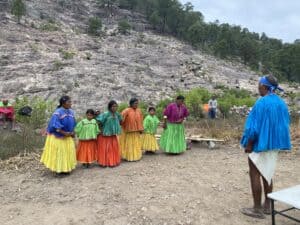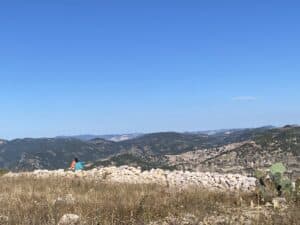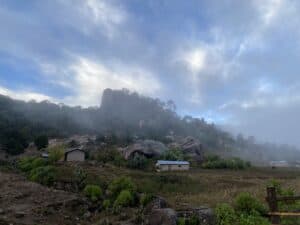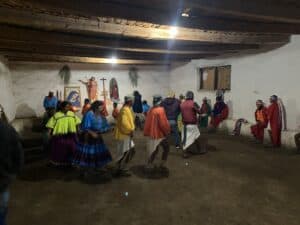Much has been said about the Tarahumara or Rarámuri (as they describe themselves) people, especially that they are endurance runners who cover long distances on foot without getting tired, or about their traditional ball and ariweta running games. But it seems to me that little has been said about Rarámuri mysticism and spirituality.
I’ll start by talking about a dream I had. In the Rarámuri culture, dreams are of vital importance: the owirúame (or traditional healers) heal through dreams, a dream can help or warn of something, the question: “What did you dream?” (“Piri rimuri?”) is one of the first questions asked when greeting someone in the morning. During my visit to the community of Gavilana, in the parish of San Miguel de Guaguachique, where I collaborate, I had a very vivid dream: God asked me to make “yumari”, the Rarámuri religious feast, the sacrament of the Tarahumara culture that has lasted through the centuries. This led me to carry out a series of long and winding preparations like the paths of the ravines. I shared my dream with Rebeca, the siríame (indigenous governor) of the Samachique community and she told me that I had to do the yumari soon. Then I spoke with Santiago, the owirúame of Gavilana, and we agreed on the date. In my dream there was also Belasio, a Rarámuri from the community; he also helped me.
I arrived in Gavilana a week before the yumari. The intention was to accompany the families in their celebration of the faithful departed, but also to organize the yumari well. The context of Gavilana is difficult: there are no roads to get there, you have to walk 12 km through the mountain in order to get there. Once in the community, everything is dispersed: the Jesuit house is as far away as the family houses, and there is no telephone coverage anywhere, except in the high areas, which implies another 3 to 4km of walking. This apparent disconnection from the virtual world allowed me to connect with the world around me: the mountains, the forest, the people, the language. In the community, few people speak Spanish, and those who speak Spanish prefer to speak Rarámuri. In their native language they understand and communicate in an impressive way.
The distances, the language, and the remoteness were factors that allowed me to reconnect with what lives inside me, with God. I got sick with the flu and our first aid kit was outdated: there was nothing to improve nasal congestion or fever, just sleep and drink plenty of fluids. I had to go visit many people to invite them to the yumari celebration, but also to resolve basic issues: corn, tortillas, pinole, everything that was going to be shared to eat and drink that day, who was going to work on what and how were they going to do so, etc.
Paradoxically, disconnecting provided me an opportunity to reconnect with what was essential: God living in the midst of his people, a poor people who share with their God what they have. The yumari happened in an incredible way, everything was very well organized, and people were happy praying, dancing, eating and drinking. In the healing rite I felt deeply confirmed by God in my mission, in having been placed there, like Saint Ignatius, with the Son carrying the cross, with the Rarámuri people who carry multiple crosses and who face multiple threats: violence of drug trafficking, climate change and droughts, an arrogant and insensitive Western culture, education decontextualized from its reality, welfare government programs that harm their communities, churches of other Christian denominations that erode and fracture families and peoples… the list could go on. Faced with all this, the Rarámuri stand before the world celebrating: dancing, sharing and enjoying: among themselves, with Onorúame panina betéame (the one who lives above) and with us who, although not a part of them, have been adopted by them as such.
In summary, from my experience I could dare say that Rarámuri mysticism is a mysticism of doing: partying, dancing, working… but also of contemplating, of letting the weight of reality even out the world, making it fairer, as when you step on your sleep when dancing the pascol or the matachín. Rarámuri mysticism is also joyful, because on their feasts and celebrations there are solemn moments sprinkled with laughter and jokes, making room for mistakes and learning, without belittling anyone. It is a mystique of depth, because it encompasses the person in all its dimensions: spiritual, physical, intellectual… as an unfragmented whole, an integrated whole. And it is a mysticism that connects with the essential, not with the superficial, it goes to the existential root and allows us to recognize the meaning of our daily living and doing, painting life with the tones of a God who loves his sons and daughters because he shares with them everything that happens in their daily lives. Rarámuri mysticism is a lesson for our Western minds, for our lost lives, for our damaged planet and for our Catholic Church.




The post Rarámuri Spirituality first appeared on The Jesuit Post.